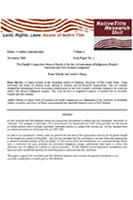The family connection when a charity is for the advancement of Indigenous Peoples: Australia and New Zealand compared
In both Australia and New Zealand various tax concessions are granted to entities that are considered ‘charitable’ or ‘charities’. For example, in Australia s 50-1 of the Income Tax Assessment Act, 1997 (Cth) provides that the income of certain entities (which includes Australian charitable entities) is exempt from income tax. In New Zealand there are similar provisions in the Income Tax Act 2007 (NZ).
In order to be considered a charity under the general law the aims of the organisation must be for the public benefit or the benefit of a section of the public. The case law provides that this restriction is not met where the organisation is aimed at assisting members of the one family, in other words where the beneficiaries are connected through blood. Such a restriction can pose problems for Australian Indigenous groups, particularly land rights or Native Title claimants who are defined by a family or blood connection. In New Zealand several legislative amendments have been enacted to extend the meaning of charitable purpose and overcome this restriction.
This paper compares the Australian and New Zealand situations and considers the question of whether or not Australia should follow a similar path to New Zealand.
